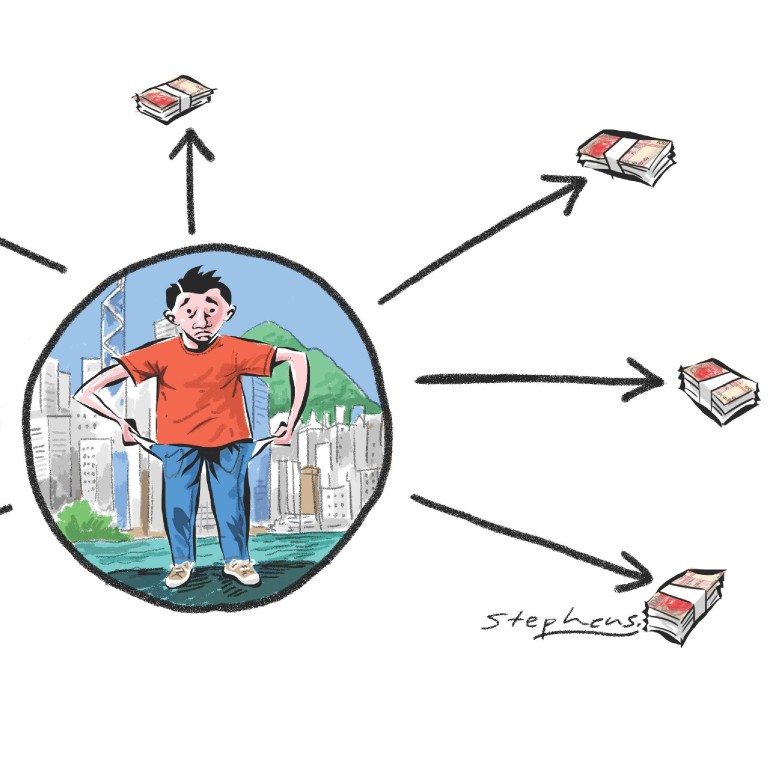
Hong Kong government should stop outsourcing its low-paying jobs
Paul Yip says the government's outsourcing of low-paying jobs comes at the expense of workers' welfare
The rationale of outsourcing public services is to cut costs and maintain a small but efficient government that can focus on core business functions. It can be an effective cost-saving strategy when used properly.
The Hong Kong government has been outsourcing many services since 2001. Last year, there were nearly 60,000 contracted workers in various government departments. Among those, the Housing Department, the Food and Environmental Hygiene Department, and the Leisure and Cultural Services Department account for nearly 90 per cent of the contracted workers being employed.
Most of these people are in low-skilled and low-paid work, such as the security guards, cleaners and service workers.
Leo Goodstadt, the former chief of the Central Policy Unit under the colonial government, suggested in his book, , that government outsourcing is based on a private business model to minimise expenditure and maximise productivity, with little concern for the welfare of workers.
In a recent Legislative Council meeting on outsourcing, the government failed to provide any information about how much money is being saved by outsourcing. More worryingly, officials also failed to describe any method of, or interest in, ensuring the well-being of contracted workers.
Contracted employees of these "middlemen" companies are underpaid, overworked and have no job security and few career prospects. Staff morale is often low, and there are high turnover rates.
Outsourcing has created a pool of low-income earners in the community. Their livelihoods are easily threatened by the abundant supply of manpower migrating from mainland China.
Outsourcing has widened the income gap of the working population in Hong Kong. One simple example illustrates the point very well. Ordinarily, a cleaner employed by the government would be on a monthly wage of around HK$11,000. Outsourcing the work, however, the government only has to pay HK$9,000.
Workers employed by the outside company are paid about HK$7,000, with the remainder providing the company with a reasonable profit margin. So, cleaners who normally could have earned HK$11,000 are instead getting HK$7,000 to do the same job - and with less favourable working conditions.
At the same time, these low-income workers may need to apply for a government transport subsidy to get to work. Based on figures from the Census and Statistics Department, the median income of workers rose by nearly 80 per cent from HK$10,000 in 1991 to HK$18,000 in 2001. However, from 2001 to 2011, salaries increased by only 12 per cent, from HK$18,000 to HK20,500, whereas Hong Kong's gross domestic product for the same period increased by more than 40 per cent.
Thus, Hong Kong society as a whole is richer but those on a low income have not benefited as much from this economic growth. As a matter of fact, the salaries of low-income earners were even lower until the implementation of the minimum wage in 2011.
There are proven weaknesses in the existing system. The government needs to invest more in homegrown products and services to ensure their quality and consistent delivery.
There is little control of outsourced work and employees as the company does all the hiring and firing, and while the government could monitor the procedures and results, it would certainly incur higher costs for doing so. The lack of sufficient monitoring compromises transparency and accountability as well as the quality and timeliness of the goods and services delivered.
What do we gain by outsourcing? Financially little, but the negative impact can be enormous. While the government might save 10-20 per cent on salaries through outsourcing, the significant number of contract workers in our community are providing vital services but receiving the very minimum in return. This affects not just workers' well-being but also that of their family members.
Furthermore, contract services tend to last two to three years and companies are unwilling to invest in automation and innovation in the workplace.
It is surprising and disturbing to learn that the government has no information on how much money is being saved by outsourcing the work, and apparently has no interest in assessing the well-being of the workers.
By outsourcing some jobs, the government creates more work for itself, since it now needs to appoint staff to deal with the outsourcing companies. And the low-paid workers may end up needing social assistance, thus adding to the burden on the social security network.
A job with a reasonable salary in any society is more than just a business transaction, especially when it comes to providing a government service. It is a commitment to its people and an opportunity for less-skilled citizens to advance their well-being by working and contributing to economic development.
As a society, we need to rethink remuneration for low-income groups, given the low levels of social assistance here. It is time to reconsider the government policy of outsourcing work; it should certainly not be done out of short-term financial considerations, at the expense of people's interests.
At present, the government is not only outsourcing the work but also its responsibility to workers. It has enough in its reserves to invest in capacity-building, rather than trying to rip off the vulnerable in society. It is time to provide real jobs for real pay to Hong Kong people.

